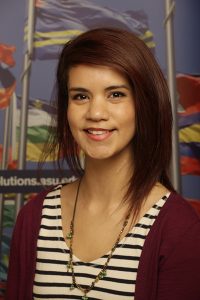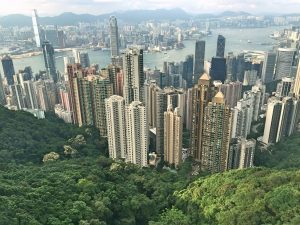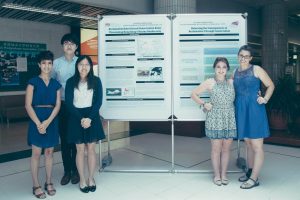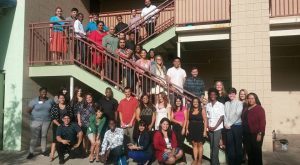
From a Public Policy Rookie to a Public Ally
It’s been several months since my return from my trip to Hong Kong, although it doesn’t quite feel like it has been that long. During those very brief – yet intensive – two weeks of my stay there, I learned more about the public policy process and its dynamics than anything else. Before going to Hong Kong, I was not exactly an enthusiast of the policy-making process or politics, not even in the slightest bit. Nonetheless after my experience in the “Pearl of the Orient,” I started to care and pay more close attention to the events in my own local community as well as the national 2016 presidential race. In other words, I put on my critical thinking cap and I became more invested as an engaged, civic-minded citizen.
Granted, the political and the physical landscape of Hong Kong and my hometown Phoenix contrasts immensely. I’ve learned that Hong Kong had been long occupied by the British since mid-19th century until China was able to cede and gain freedom during the 1980s. Hong Kong was then signed into agreement as a Special Administrative Region of China (SAR) and was promised that a “one country, two systems” policy would be established. This agreement has allowed Hong Kong to enjoy a high degree of self-autonomy, yet is at a political crossroads with the pro-democracy Umbrella Movement gaining traction. What’s more is that Hong Kong is a city that lives vertically up, rather than sprawled out and dispersed like Phoenix. It’s like comparing apples to oranges, so how was it possible for me to apply Hong Kong’s issues and policy solutions to the U.S., especially in Phoenix?
 That’s when it hit me that “Public Policy” and “Impact” was the common formula, yet one that produces conflicting results. This proved to be very true where my Hong Kong group focused on biodiversity and conservation issues, in which land reclamation was the main focus. Land reclamation are artificial lands that have been created on top of rivers and oceans which damages the marine ecosystem, fishing resources, and people’s livelihoods. On the flipside, land reclamation has also produced great economic development and more land for building. Public projects have moved forward with little regard for their influence on people’s well-being and no clear framework or collaboration for evaluating impact.
That’s when it hit me that “Public Policy” and “Impact” was the common formula, yet one that produces conflicting results. This proved to be very true where my Hong Kong group focused on biodiversity and conservation issues, in which land reclamation was the main focus. Land reclamation are artificial lands that have been created on top of rivers and oceans which damages the marine ecosystem, fishing resources, and people’s livelihoods. On the flipside, land reclamation has also produced great economic development and more land for building. Public projects have moved forward with little regard for their influence on people’s well-being and no clear framework or collaboration for evaluating impact.
 Still, the study abroad program did not turn me into a public policy expert, but what I did gain was a better understanding of how politics and economics play a role during the decision-making process, wherein I did not have that awareness before. It could be said true for anywhere in the world that the economy is a big deal, which is the backbone for how a society runs and the government in turn makes decisions based on the economics of such society. These decisions profoundly affect us all, whether we like it or not. To me, civic literacy matters among community participants and voters because it contributes to good governance and social equity.
Still, the study abroad program did not turn me into a public policy expert, but what I did gain was a better understanding of how politics and economics play a role during the decision-making process, wherein I did not have that awareness before. It could be said true for anywhere in the world that the economy is a big deal, which is the backbone for how a society runs and the government in turn makes decisions based on the economics of such society. These decisions profoundly affect us all, whether we like it or not. To me, civic literacy matters among community participants and voters because it contributes to good governance and social equity.
 After the completion of my study abroad program, I had officially graduated from ASU and got accepted into an AmeriCorps program called Public Allies, which is operated by ASU’s Lodestar Center for Philanthropy and Nonprofit Innovation. Through Public Allies, I was placed at the Maricopa County Education Service Agency and am currently working on the Opportunities for Youth initiative as a data analyst fellow. With my position, I assist in gathering data about disconnected youths in Maricopa County and develop tracking tools to help inform and guide the practices of the Opportunity Youth board of directors. Making a connection between my current work placement and the study abroad program, I’ve recognized the importance of developing an agenda that is results-driven and involves the entire community. The Hong Kong government does not have that social democratic aspect in their policy agenda and I don’t know when Hong Kong will begin a policy process that includes everyone’s voices, but engaging in an action that helps build cohesive framework will move a society toward a future that’s sustainably minded.
After the completion of my study abroad program, I had officially graduated from ASU and got accepted into an AmeriCorps program called Public Allies, which is operated by ASU’s Lodestar Center for Philanthropy and Nonprofit Innovation. Through Public Allies, I was placed at the Maricopa County Education Service Agency and am currently working on the Opportunities for Youth initiative as a data analyst fellow. With my position, I assist in gathering data about disconnected youths in Maricopa County and develop tracking tools to help inform and guide the practices of the Opportunity Youth board of directors. Making a connection between my current work placement and the study abroad program, I’ve recognized the importance of developing an agenda that is results-driven and involves the entire community. The Hong Kong government does not have that social democratic aspect in their policy agenda and I don’t know when Hong Kong will begin a policy process that includes everyone’s voices, but engaging in an action that helps build cohesive framework will move a society toward a future that’s sustainably minded.

